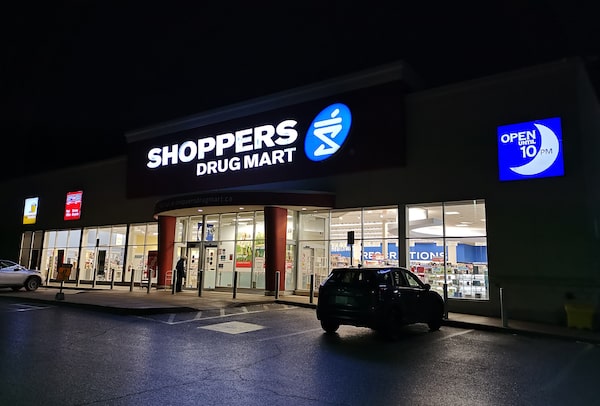
The backlash to Manulife's now-reversed announcement that it would only cover specialty drug prescriptions filled at Loblaw-owned Shoppers Drug Mart should spur public policy.Doug Ives/The Canadian Press
Vass Bednar is the founder of Regs to Riches, a senior fellow at CIGI and the executive director of McMaster University’s master of public policy in digital society program.
Amid public backlash, Manulife announced last week that it would cover specialty drug prescriptions filled at any pharmacy, just days after declaring it would only cover the cost of those drugs if the prescriptions were filled at Loblaw-owned Shoppers Drug Mart.
It was super satisfying on social media. It felt like an intoxicating reminder of the potency of everyday people pushing back against corporate power. A popular scheme that is familiar in the U.S., known as a “preferred pharmacy network” (PPN), was swiftly rejected by Canadians.
But the “win” for competition and consumer rights was circumstantial and won’t be substantive without official policy action.
PPNs allow a pharmacy or group of pharmacies to enter into an exclusive deal whereby they are the only ones that can dispense certain drugs covered under a health insurance plan. This forces plan members to purchase their medications at the selected pharmacy or pay for them out of pocket.
These agreements change the marketplace for medicine – in the companies’ favour. While they can offer some cost savings, they may also fundamentally hurt the bottom line of independent pharmacies that lack the same negotiating power. Furthermore, more expensive medicines may be a mechanism to offset other cost savings the smaller pharmacies are able to provide.
The pushback against Manulife’s MFC-T deal with Loblaw L-T is not surprising. The arrangement seemed directly imported from the U.S., where the health care system is characterized by a market-based approach, so people felt it was incongruent with the equal and unrestricted access we have sought to build our health care system around.
But it was not the first exclusive deal between a pharmacy network and an insurer. A 2018 memo from the Ontario Pharmacists Association summarized closed PPNs managed by Great West Life, Sun Life Financial, Manulife Financial (a previous arrangement with Bayshore Health for specialty drugs), Equitable Life, GreenShield, RBC Insurance, Desjardins and Empire Life.
A questionable business practice has quietly become the new normal instead of being pro-actively addressed as a troubling trend.
But not in Quebec. The province’s Bill 92 has a clause that states: “No group insurance contract or employee benefit plan may restrict a beneficiary’s freedom to choose a pharmacist.” It came into force eight years ago.
Ahead of much-anticipated policy progress on pharmacare, other provinces should consider quickly mirroring Quebec’s clear stand against limiting a supply of medications to a restricted number of pharmacists. And it can be done.
In Ontario, there is already a rule that pharmacies cannot have pharmacists prescribe their own generic drug brands or generics they have agreements with. Back in 2006, Ontario became the only province to ban these kinds of rebates, arguing that if generic companies could reduce the prices of their products, then the savings should go to the patients, taxpayers and workplace insurance plans that ultimately pay for medications − not to pharmacy operators’ bottom lines.
This seems relevant in terms of clearly codifying a value: Firms should not be able to privilege their own drugs in their own pharmacies. So why would we permit pseudo-exclusivity to certain drugs to select insurers? And why should we let insurance companies tell us which health care provider we can use?
We must clarify the country’s position on deals such as Manulife and Loblaw’s through public policy. Achieving coherence across the country is relevant, as the pharmacy industry has seen the relative advantages of geography erased through e-commerce.
An intriguing element of the initial announcement was the insistence from Shoppers Drug Mart that patients who might have been out of range of one of its stores would still be “covered” because their medications could be mailed. The newish ability to get your drugs by mail (governed by Canada Post and Health Canada, with requirements for identification upon delivery) also alters the pharmaceutical playing field and elevates the largest companies, which have significant shipping and logistics capacity. It feels inevitable that Amazon Pharmacy will eventually come to Canada.
We need to emulate Quebec’s legislative leadership. We also need an assessment from the Competition Bureau on the alignment that PPNs have with the Competition Act.
A clear stand articulated in public policy is the best way to pool our risk and protect patient interest and unrestricted access to drugs.